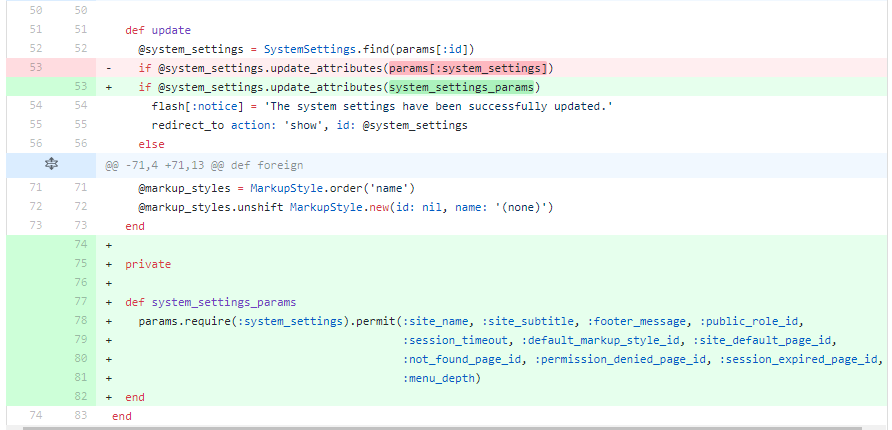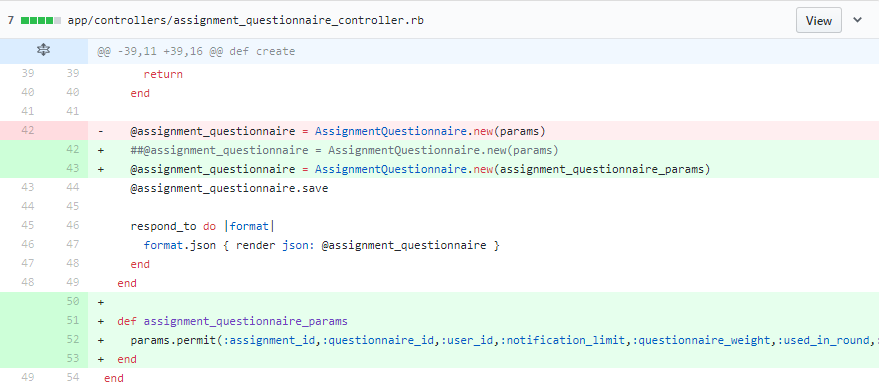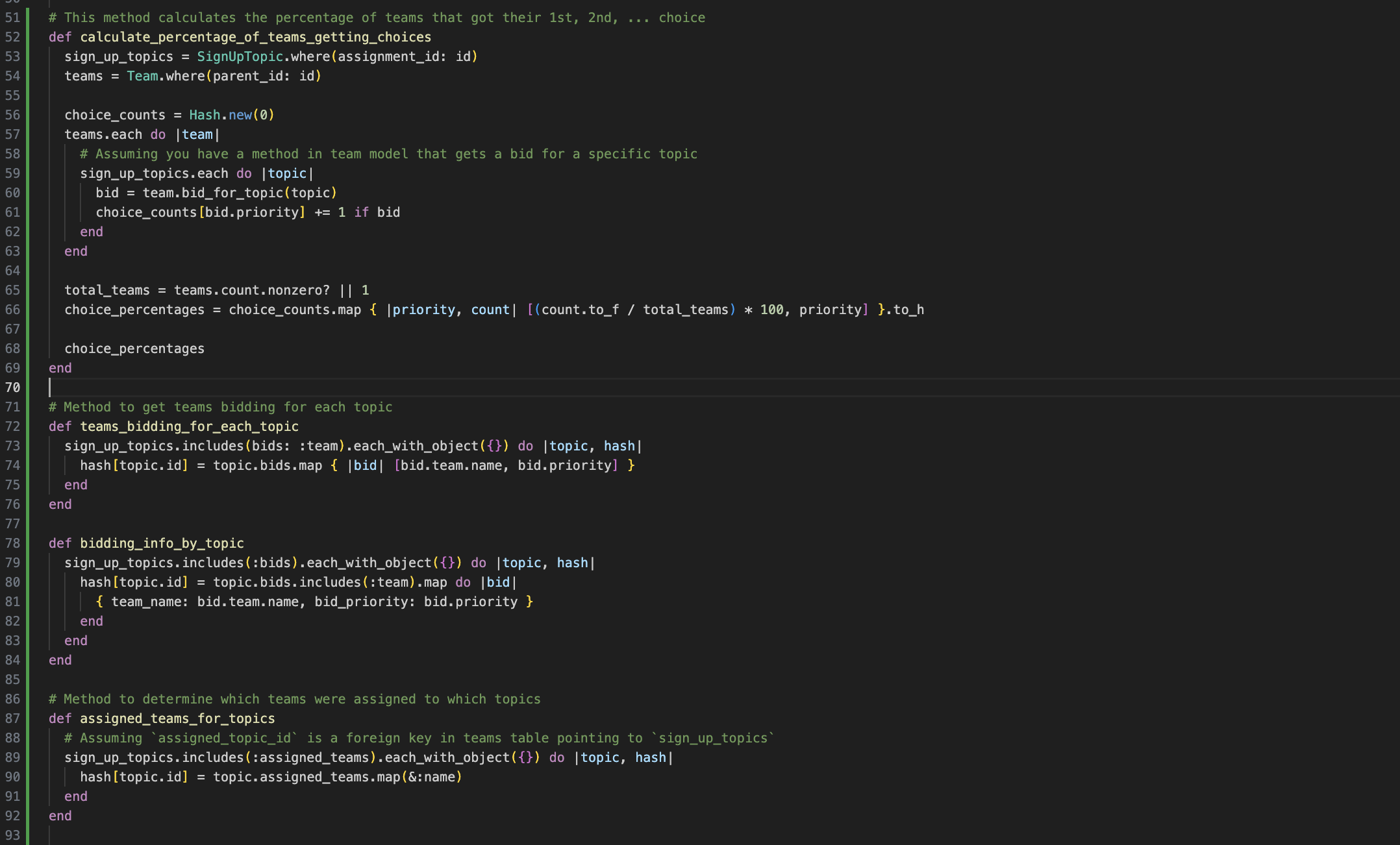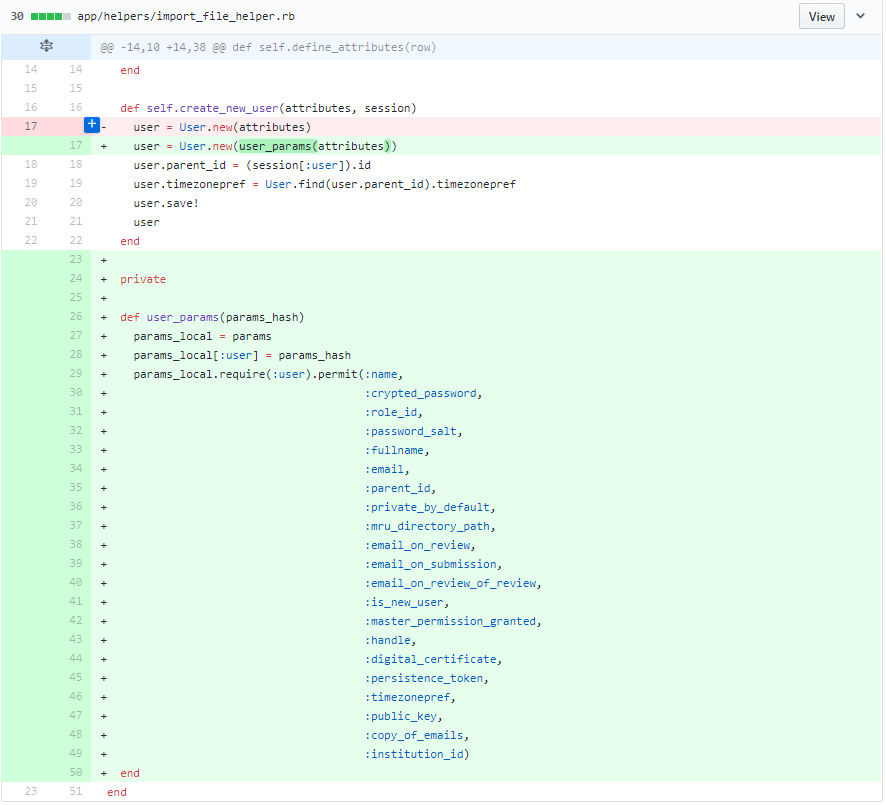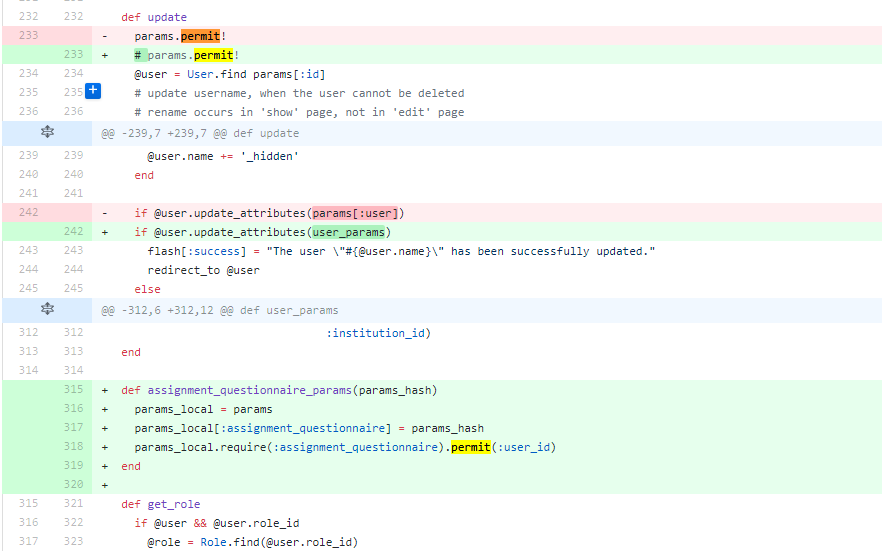CSC/ECE 517 Fall 2017/E1784 Fix mass assignments reported by Brakeman.rb
About Expertiza
Expertiza is an open source project based on Ruby on Rails framework. Expertiza allows the instructor to create new assignments and customize new or existing assignments. It also allows the instructor to create a list of topics the students can sign up for. Students can form teams in Expertiza to work on various projects and assignments. Students can also peer review other students' submissions. Expertiza supports submission across various document types, including the URLs and wiki pages.
Introduction
Background
Mass Assignment is the name Rails gives to the act of constructing your object with a parameters hash. It is "mass assignment" in that you are assigning multiple values to attributes via a single assignment operator.
The following snippets perform mass assignment of the name and topic attribute of the Post model:
- Post.new(:name => "John", :topic => "Something")
- Post.create(:name => "John", :topic => "Something")
- Post.update_attributes(:name => "John", :topic => "Something")
Without the convenience of mass assignment, we'd have to write an assignment statement for each attribute to achieve the same result. Here's an example:
- attrs = { :name => "John", :topic => "Something" }
- post = Post.new
- post.name = attrs[:name]
- post.topic = attrs[:topic]
Obviously, this can get tedious and painful; so we bow at the feet of laziness and say, yes yes, mass assignment is a good thing.
Problem Statement
With the help of mass assignment, when we create or update certain object, we do not need to write an assignment statement for each attribute. But mass assignment could cause security vulnerabilities. Hackers could add other parameters to do some bad things. For example:
- @post = Post.new(params[:post])
Typically this is used when the user submits a form rendered by a form_for @post. In an ideal world, the params[:post] hash should only contain the fields we displayed on the form. However, it is trivial easy hackers to pass additional fields in their request, so in effect you're allowing a user to set any fields on @post, not just the ones displayed on the form.
How to Deal With Mass Assignment? In models, we need to add "attr_accessible" to implement the whitelist. For example:
class User < ActiveRecord::Base
attr_accessible :first, :last, :email
end
Here, we're explicitly listing out what can be mass-assigned. Everything else will be disallowed. The advantage here is that if we, say, add an admin flag to the User model, it will automatically be safe from mass-assignment.
For controllers, Rails 4 introduces strong parameters, which is a new approach to protect mass assignment. For example:
class UsersController < ApplicationController
def update
user = User.find(params[:id])
if user.update_attributes(user_params) # see below
redirect_to home_path
else
render :edit
end
end
private
# Require that :user be a key in the params Hash,
# and only accept :first, :last, and :email attributes
def user_params
params.require(:user).permit(:first, :last, :email)
end
end
Now, if you attempt something like user.update_attributes(params), you'll get an error in your application. You must first call permit on the params hash with the keys that are allowed for a specific action.
So our group needs to resolve all these "Unprotected mass assignment" issues according to Brakeman report.
Implementation
Problem 1: Potentially dangerous attribute available for mass assignment
Previsouly, only two attributes :parent_id, :node_object_id are protected. So we removed the two attributes so that all attributes in all models will be mass assignment protected.
Problem 2: Mass assignment is not restricted using attr_accessible
If there was no protection at all in the model file. We just added "attr_acessible".
Problem 3: Unprotected mass assignment
We modified the code in an unobtrusive way, i.e. processing the mass assignment parameters with a function without changing them directly.
Parameters come from requests
Fix unprotected mass assignment in update
Fix unprotected mass assignment in new
Parameters come from other objects
If the parameters come from requests, we can directly use "params.permit()" to implement a whitelist. However, if the parameters come from values of other objects, we cannot directly call that built-in function. Firstly, we need to build a hash with those values and pass the hash into "params". And then we can filter the parameters using permit().
Fix unprotected mass assignment in create
Fix unprotected mass assignment in new
params.permit!
Reference
- https://github.com/expertiza/expertiza
- https://codeclimate.com/github/expertiza/expertiza/issues?category=security
- https://apidock.com/rails/ActiveModel/MassAssignmentSecurity/ClassMethods/attr_accessible
- https://docs.google.com/document/d/1rdolBAHxVGI9I0N-cT866AqnfORM2L1_m_bo2gRYRrI/edit#
- https://www.happybearsoftware.com/how-i-avoid-the-rails-mass-assignment-security-mistake
- https://code.tutsplus.com/tutorials/mass-assignment-rails-and-you--net-31695


